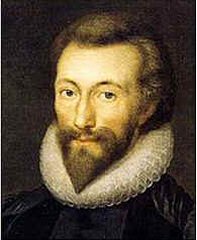John Donne

John Donne
John Donne is a noted 17th century poet. He was born about 1572 in Bread Street in London and raised as a Roman Catholic by his mother. During the reign of Queen Elizabeth I (1558-1603) Roman Catholics were increasingly persecuted as plots against the Queen's life by disaffected Catholics became more numerous, especially with the arrival in England of the Jesuit Order, sent out by the Papacy to foment discontent and to try to turn people away from the Church of England, re-established by Elizabeth after the Roman Catholic resurgence and persecution of Protestants under her sister Mary I (1553-1558).
Donne was admitted as a lawyer to Lincoln's Inn, 1592 and sailed with the Earl of Essex's expedition against Cadiz in 1596, thus demonstrating his loyalty to England over Catholic Spain. In 1598 he became secretary to Thomas Egerton, Keeper of the Great Seal, but was dismissed in 1601 not because of his religious orientation but because he married Egerton's niece against the wishes of her father and Egerton himself.
The next year he became Member of Parliament for Brackley. In 1611 he showed he had abandoned Catholicism when he published two anti-Papist tracts: Pseudo-Martyr and Ignatius his Conclave. He received his MA from Oxford University in the same year. King James I (1603-1625) urged him to take holy orders but he dithered for a while, feeling unworthy. He was eventually ordained in 1615 and made chaplain to the King, becoming Dean of Saint Paul's, a well-paid post in 1621.
Donne became Rector of Blunham in 1621. He had been promised the rectory by the Lord of the Manor and Patron of the Living, Charles Grey, 6th Earl of Kent. Donne made a gift of a paten and chalice (for administering the consecrated bread and wine at Holy Communion) to the church but did not live in Blunham. He was an absentee rector and engaged a curate to minister to the congregation. The Sermons of John Donne edited by G. R. Potter and E. M. Simpson in ten volumes (1959) states: "It appears Donne regularly visited Blunham…A curate was in charge, but Donne was more conscientious than most pluralists [those holding more than one living] in going each year to see how the parish was faring, and in preaching there for a few weeks. In the late summer of 1628 he wrote to Mrs. Cockain telling her how after he had visited Kent and Peckham [Surrey] he went into Bedfordshire, and there on his third Sunday at Blunham he was seized with a fever which forced him to return to London to consult his physician" [CRT130Blu3].
Donne had nearly died in the winter of 1623-1624. He had a condition which has been interpreted by modern historians as either typhus or a severe cold followed by a fever. During his recuperation he wrote a series of prayers and meditations on health and illness; chiefly remembered for two phrases: "for whom the bell tolls" and the statement that "no man is an island". On the death of James I Donne became chaplain to his son Charles I (1625-1641).
A hundred and sixty of Donne's sermons have survived as well as the better known poems. He died, still Rector of Blunham, on 31st March 1631; it has been suggested that his final illness was stomach cancer. He is buried in his own cathedral of Saint Paul's where he has a memorial statue he had himself designed, showing his dead body in a shroud.
This sample of John Donne's poetry "Hymn to God the Father" was written during his illness of 1623 and later set to music:
Wilt Thou forgive that sin, by man begun,
Which was my sin though it were done before?
Wilt Thou forgive that sin, through which I run,
And do run still, though still I do deplore?
When Thou hast done, Thou hast not done,
For I have more.
Wilt Thou forgive that sin which I have won
Others to sin, and made my sin their door?
Wilt Thou forgive that sin which I did shun
A year or two, but wallowed in a score?
When Thou hast done, Thou hast not done,
For I have more.
I have a sin of fear, that when I’ve spun
My last thread, I shall perish on the shore;
But swear by Thyself, that at my death Thy Son
Shall shine, as He shines now and heretofore:
And, having done that, Thou hast done:
I fear no more.